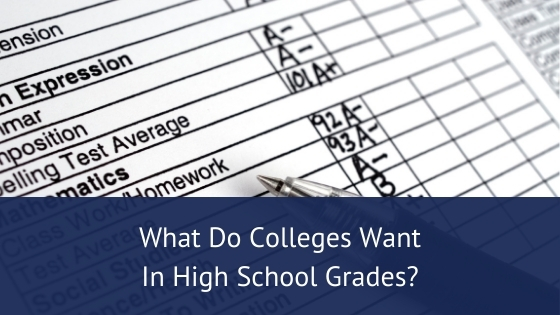Your grades in high school are important, and a big deal is made about them when you enter high school. “These grades matter, and will determine your future” is an oft-repeated phrase. How true is this phrase though? How much do grades matter?
A great deal, as it happens. The majority of colleges consider success in high school as the most important trait when deciding on applications. But what grades look best, and how can you make up for weak performances in your grades?
Improvement vs. Constancy
The best kind of academic performance is continual success in the most challenging classes. This is not much of a revelation, but it is worth stating. If you can maintain such performance, we congratulate you. If not, you are not alone, and are probably wondering what your best options are.
The sad news is that there is no one-size fits all answer. There are however some things which can be said for sure:
- Showing improvement is better than consistent mediocrity. Getting better grades in the same level of classes, or taking harder classes while maintaining academic performance is more impressive than simply maintaining the same level of adequate performance.
- Getting lower grades in harder classes vs better grades in easier classes is a toss-up. It depends on what each school values. Schools that consider unweighted GPA may inadvertently favor getting higher grades in easier classes.
- Having consistent low-level performance is less than ideal. The worst possibility, however, is a decline in grades over the course of high school. A decline in grades shows the student struggling more the more advanced material becomes, which makes schools worry that students will be unable to cope with the level of work required in college.
- If a singular event or issue caused a drop in grades or otherwise hurt your academic performance, this should be discussed in the additional information section. If your grades suffered due to no fault of your own, due to an illness or a family situation, schools may overlook a weak semester or grade.
While constant success is ideal, showing an improvement in grades over time is also acceptable by most schools. This kind of improvement shows the student maturing and becoming more dedicated to their work as high school progresses. Schools understand that students may mature at different rates, and that not all are ready for the pressures of high school immediately. The important thing is for students to adapt to these pressures, and show that they do have what it takes to succeed.
Senior year is too late for this turnaround to matter. Improvements should begin after freshman year. One year of struggles can be excused if improvement is shown, multiple years suggests a trend. This trend will make colleges leery of accepting a student, as a trend of poor performance seems likely to continue.

What if You Don’t Succeed?
Not every student is immediately successful in high school; that is the nature of high school. What then should you do if you are struggling in high school, and don’t see any hope of improving?
The simplest method for fostering improvement is to hire outside help. There are myriad tutors for every subject, and general tutors to help students organize their time and study habits. The best tutors can help students improve in multiple areas, and while it may be late in your high school career, some improvement is better than none.
Some students are not in a position to hire a tutor however, due to time or financial constraints. While there is some improvement which you should undertake alone, the problem is many high school students are not in a good place to do so.
In these situations, attending a community college in order to collect your thoughts and learn how to organize and learn before transferring to a more traditional four-year institution is a good option to consider. While most students dream of attending an elite college directly out of high school, some don’t have the grades to support their ambitions. Here transferring is the best method for them to make the best use of their time in college.
Students who have shown some improvement over the course of their high school career, but do not have the grades to apply directly to their top choice institution should take a year or two at a smaller state school or community college. These schools are easier to get into generally, and tend to be cheaper than their more elite private counterparts.
By attending these schools, students can gain college credit, and will have to spend less time taking core classes and prerequisites at other institutions. When trying to transfer, many schools only care about your record in college, meaning students who performed poorly in high school will be able to leave past failings behind, and apply fresh with their better collegiate record.
Do Test Scores Make Up For Grades?
What if you have a low GPA but a high SAT? Some students hope that by achieving high scores on standardized tests, they will be able to overcome colleges’ hesitation caused by their less than stellar academic performance. This hope has some merits, but is misplaced in most cases.
The most elite colleges weigh grades far heavier than test scores, as while test scores are important for admissions, grades are found to correlate more with success in college than high test scores. Some schools, such as the University of California system, do not even consider test scores when deciding on application decisions.
State schools often consider test scores the most, with some allowing for automatic admissions for students with certain class ranks and test scores. While not all schools do this, high performance in standardized tests can make up for some academic weakness.
Students who are explicitly focused on the humanities can afford weaker scores in a math class or two if they have decent test scores, and the reverse is true for students interested in the sciences. This is not the case at the most elite schools, but other competitive schools allow for more leeway.
Final Thoughts
High school is a stressful time, and it can be hard to maintain the kind of academic performance colleges want to see. That said, even if your high school career is not perfectly smooth, there are still ways to demonstrate to colleges that you are academically ready to face their curriculums.
If you are struggling in high school and do want help, we here at Ivy Scholars are well equipped to give you the aid you need. With skilled tutors, we can help you master various high school subjects, and teach you studying and time management tools to let you build a habit of success. Feel free to reach out to us for a free consultation, we are always eager to hear from you.








